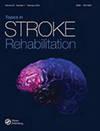自我效能感在早期中风康复中的预测作用。
IF 2.2
4区 医学
Q1 REHABILITATION
引用次数: 0
摘要
简介:生物心理社会学方法包含以人为本的因素,为中风后康复潜力提供了宝贵的见解。目的评估自我效能对住院康复期间功能独立状态变化的预测作用。方法入住住院康复机构(IRF)的中风患者在入院和出院前完成一套评估,包括运动评估、参与者报告的自我效能(中风自我效能问卷)和功能独立性状态评估(IRF-患者评估工具中的自理和行动能力质量指标(QI)总和)。在考虑年龄、卒中后时间和 IRF 住院时间的情况下,进行线性回归以确定自我效能对 IRF 住院期间 QI 变化的预测性能。结果30 名脑卒中患者(14 名女性,年龄 = 67.0 ± 9.80 岁,脑卒中后 10.4 ± 3.46 天)被纳入研究。入选 IRF 时的自我效能解释了队列(R2 = 30.7%,p = .001)和中度至重度运动障碍亚组(n = 12;R2 = 49.9%,p = .010)中 QI 变化方差的显著百分比。在考虑了混杂因素后,自我效能仍是队列模型(n = 30)的重要预测因素。因此,将自我效能感纳入多方面的评估框架中,可以为治疗师提供更多的知识,从而更好地为患者量身定制治疗方案,从而优化康复效果。本文章由计算机程序翻译,如有差异,请以英文原文为准。
Predictive utility of self-efficacy in early stroke rehabilitation.
INTRODUCTION
A biopsychosocial approach entailing person-centered factors provides valuable insight to post-stroke rehabilitation potential. The consideration of an individual's belief in their capabilities, known as self-efficacy, may prove especially informative in the inpatient rehabilitation setting where motor learning often occurs.
OBJECTIVE
To assess the predictive utility of self-efficacy in functional independence status change during inpatient rehabilitation.
METHODS
Individuals with stroke admitted to an inpatient rehabilitation facility (IRF) completed an assessment battery near IRF admission and discharge involving motor assessments, participant-reported self-efficacy (Stroke Self-Efficacy Questionnaire), and functional independence status evaluation (sum of self-care and mobility Quality Indicators (QI) from the IRF-Patient Assessment Instrument). Linear regression was performed to determine the predictive performance of self-efficacy on QI change during IRF stay while accounting for age, time post-stroke, and IRF length of stay. Regression procedures were repeated for separate subgroups based on initial motor impairment level.
RESULTS
Thirty individuals with stroke (14 females, age = 67.0 ± 9.80 years, 10.4 ± 3.46 days post-stroke) were enrolled. Self-efficacy at IRF admission explained a significant percentage of variance in QI Change for the cohort (R2 = 30.7%, p = .001) and for the moderate to severe motor impairment subgroup (n = 12; R2 = 49.9%, p = .010). After accounting for confounders, self-efficacy remained a significant predictor for the cohort (n = 30) model.
DISCUSSION
Findings generated from this work support the predictive utility of self-efficacy in early post-stroke motor recovery. The inclusion of self-efficacy in a multi-faceted evaluation framework may therefore optimize rehabilitation outcomes by providing therapists with additional knowledge to better tailor an individual's care.
求助全文
通过发布文献求助,成功后即可免费获取论文全文。
去求助
来源期刊

Topics in Stroke Rehabilitation
医学-康复医学
CiteScore
5.10
自引率
4.50%
发文量
57
审稿时长
6-12 weeks
期刊介绍:
Topics in Stroke Rehabilitation is the leading journal devoted to the study and dissemination of interdisciplinary, evidence-based, clinical information related to stroke rehabilitation. The journal’s scope covers physical medicine and rehabilitation, neurology, neurorehabilitation, neural engineering and therapeutics, neuropsychology and cognition, optimization of the rehabilitation system, robotics and biomechanics, pain management, nursing, physical therapy, cardiopulmonary fitness, mobility, occupational therapy, speech pathology and communication. There is a particular focus on stroke recovery, improving rehabilitation outcomes, quality of life, activities of daily living, motor control, family and care givers, and community issues.
The journal reviews and reports clinical practices, clinical trials, state-of-the-art concepts, and new developments in stroke research and patient care. Both primary research papers, reviews of existing literature, and invited editorials, are included. Sharply-focused, single-issue topics, and the latest in clinical research, provide in-depth knowledge.
 求助内容:
求助内容: 应助结果提醒方式:
应助结果提醒方式:


